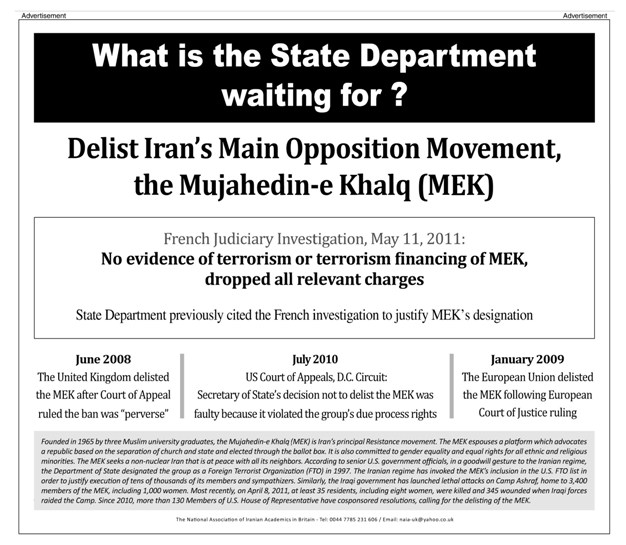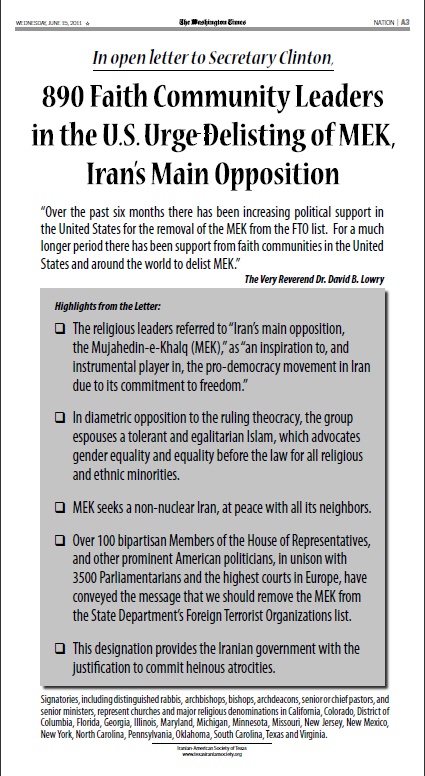United Press International
LONDON, July 6 (UPI) — As Syrian President Bashar Assad continues to defy the demands of the Syrian people for change and maintains a policy of massacring his own people, evidence has arisen of a dangerous external influence in Syria.
This external influence is not as Assad has intimated, that of Western influence in the protests, but rather the disturbing role now being played by the Iranian regime in the crackdown on the Syrian people.
U.S. Secretary of State Hillary Clinton and other U.S. officials have highlighted the growing role being played by the Iranian regime in the crackdown in Syria, including the Iranian regime supplying Syria with weapons and training to intensify the crackdown.
It can be no coincidence that the methods used by the Syrian forces are similar to those used by the Iranian regime to brutally crack down on the Iranian people’s protests of 2009.
Now as Western leaders continue to lead from behind on the issue of the Arab Spring, weak in their condemnation of the crackdowns and disappointingly lacking in their support for the democratic movements, Iran has set its sights on crushing the Arab Spring and thereby ending the hope of the Iranian people that the Arab Spring will assist their democratic opposition movement.
Lest we forget, even a heavily watered down U.N. Security Council resolution drafted by the United Kingdom and France looks to be in trouble as Russia threatens any resolution with its veto.
The Iranian regime’s influence has found itself more evidently in Iraq where the regime has helped to power Nouri al-Maliki, the Iraqi prime minister who essentially usurped power and who considers himself undoubtedly to be a deputy of the Iranian regime. The regime’s influence in Iraq was clear in April of this year when Iraqi forces under clear direction from Ayatollah Ali Khamenei carried out a violent massacre against 3,400 members of the People’s Mujahedin Organization of Iran who are resident in Camp Ashraf, Iraq, leaving 36 unarmed residents killed and more than 345 seriously wounded.
The PMOI is Iran’s largest organized opposition group and is believed to have played a leading role in recent uprisings inside Iran. Undoubtedly the group’s democratic ideals and ability to organize widespread protests inside Iran is something the regime’s hierarchy greatly fears.
As the regime shows its clear intent to support governments in the region in crushing the Arab Spring while also attempting to destroy the PMOI in Iraq and activists inside the country, the West’s failure to act against this Iranian threat could have dire regional consequences.
It is clear that the United States, United Kingdom and European Union must now do all within their power to curtail the Iranian regime’s destructive influence in the region, thereby allowing the democratic movements of the Arab Spring to continue and the flourishing shoots of the Iranian Summer to strengthen.
This was the exact demand of about 100,000 Iranian exiles who gathered June 18 in Paris to demand that the United Nations, United States and European Union guarantee protection for the PMOI members resident at Camp Ashraf and to call on Western governments to support the Arab Spring and allow it to lead into an Iranian Summer.
Iranians were not alone in their call. They were joined by 4,000 parliamentarians the world over, including the majority members of 31 parliaments who declared their support for the European plan for Ashraf, and decisively rejected the displacement of Ashraf residents inside Iraq, regarding it as a precursor to committing a new massacre.
Backed by heavyweights such as former New York Mayor Rudy Giuliani and former U.S. Department of Homeland Security Secretary Tom Ridge who addressed the gathering, the crowd highlighted that if in Iraq where U.S. soldiers remain active and where so many coalition troops have died we are unable to protect Iranians to whom the United States gave personal guarantees to protect, what hope was there for the democratic movements across the region.
As Maryam Rajavi, president-elect of the opposition National Council of Resistance of Iran, pointed out in her speech on June 18: “The world community, in particular the United Nations and the United States, are responsible for the protection and security of Camp Ashraf residents. And we tell them that you have no right to invoke Iraqi sovereignty to justify your inaction in the face of crimes against humanity and war crimes. This blatantly violates your international obligations.”
We must support the demands of the 100,000 in Paris and the millions across the Middle East who are demanding freedom and democracy. Inhibiting Iranian influence in the region is part and parcel of supporting the Arab Spring. This must be done by the United Nations providing protection to the residents of Camp Ashraf and the international community showing its support for the Iranian people’s democratic rights.
Act now and come autumn rather than bemoan the defeat of the Arab Spring we will be hailing the arrival of the Iranian Summer.
(David Amess is a member of the British Parliament from the Conservative Party)

